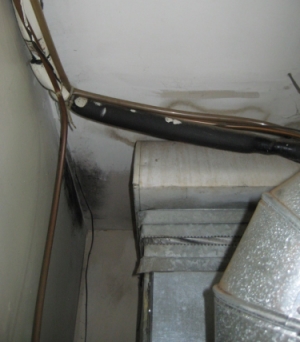How to Choose a Mold Remediation Company
 Undetected water damage in a home or office can lead to serious mold problems, which can in turn cause serious health issues. Sometimes mold remediation is not the best solution when the damage is systemic or the health of the occupants is severely compromised. (See our article When Remediation Fails.)
Undetected water damage in a home or office can lead to serious mold problems, which can in turn cause serious health issues. Sometimes mold remediation is not the best solution when the damage is systemic or the health of the occupants is severely compromised. (See our article When Remediation Fails.)
In other situations, the water damage is isolated enough to warrant remediation. But tackling the mold issue yourself can often make matters worse, as opening up a wall without proper containment can exacerbate the problem.
Finding a qualified remediator who understands the potential hazards of improper remediation can be difficult. Don't be afraid to ask the following questions before hiring a mold remediation company.
- Do you consider mold to be a potential health hazard?
While remediators are not health practitioners, they should understand the toxic nature of indoor water damage. They should be aware of the term mycotoxin and know the difference between a mold allergy and a toxic response to a poisonous substance.
- Do you recommend testing the environment?
Some type of testing should be done before and after remediation to demonstrate the success or failure of the project. This testing should not be done by the remediator, as this presents a conflict of interest. Testing from an outside source is preferable. Testing should not be dismissed as unnecessary by a potential remediator.
- Do you document your work?
Contractors should document all work with digital photos. This is especially true of work related to the removal of building materials. Digital photos should be available to the customer after the work is completed.
- Do you contain the area properly?
This is critical. If the contractor negates the need for containment, dismiss them immediately. Proper containment includes plastic sheeting and some protection at the entrance to the containment site to avoid cross-contamination. Negative air machines (NAMs) should be HEPA-filtered and exhausted outside.
- Are you insured?
Some contractors operate without any type of insurance—which may bring down their pricing, but could cost you more in the end. Look for someone who is legitimate when it comes to their business practices.
- Do your workers wear protective gear?
The answer must be yes. Workers should be outfitted with proper hazmat suits, respirators, and safety glasses. Disposable shoe covers should be worn onsite as foot traffic is a major cause of cross-contamination.
- How do you dispose of waste material?
Waste material should be bagged and disposed of immediately after removal. Items must not be stored on the premises. The disposal route should be as short as possible to minimize potential breakage or leakage. Bagged items should be double-bagged to avoid cross-contamination from the first bag.
- Do you wrap your equipment?
Air scrubbers and HEPA vacuums are inherent to the remediation process. This equipment should be contained with fresh wrap before entering your site. Equipment like this is subject to contamination from previous jobs and could make your situation worse if precautions aren't taken.
For more specifics on mold remediation, see Aerobiological Solutions' A Condensed Remediation Plan for Small Microbial Particles, which can be accessed at the website Surviving Mold.
If a contractor dismisses your questions or demeans your concerns, it might be wise to look elsewhere. Remember, you're the expert when it comes to your health. Don't be afraid to ask hard questions. Most of all, listen to your instincts as you seek to make the wisest decision for the health and well-being of your family.

